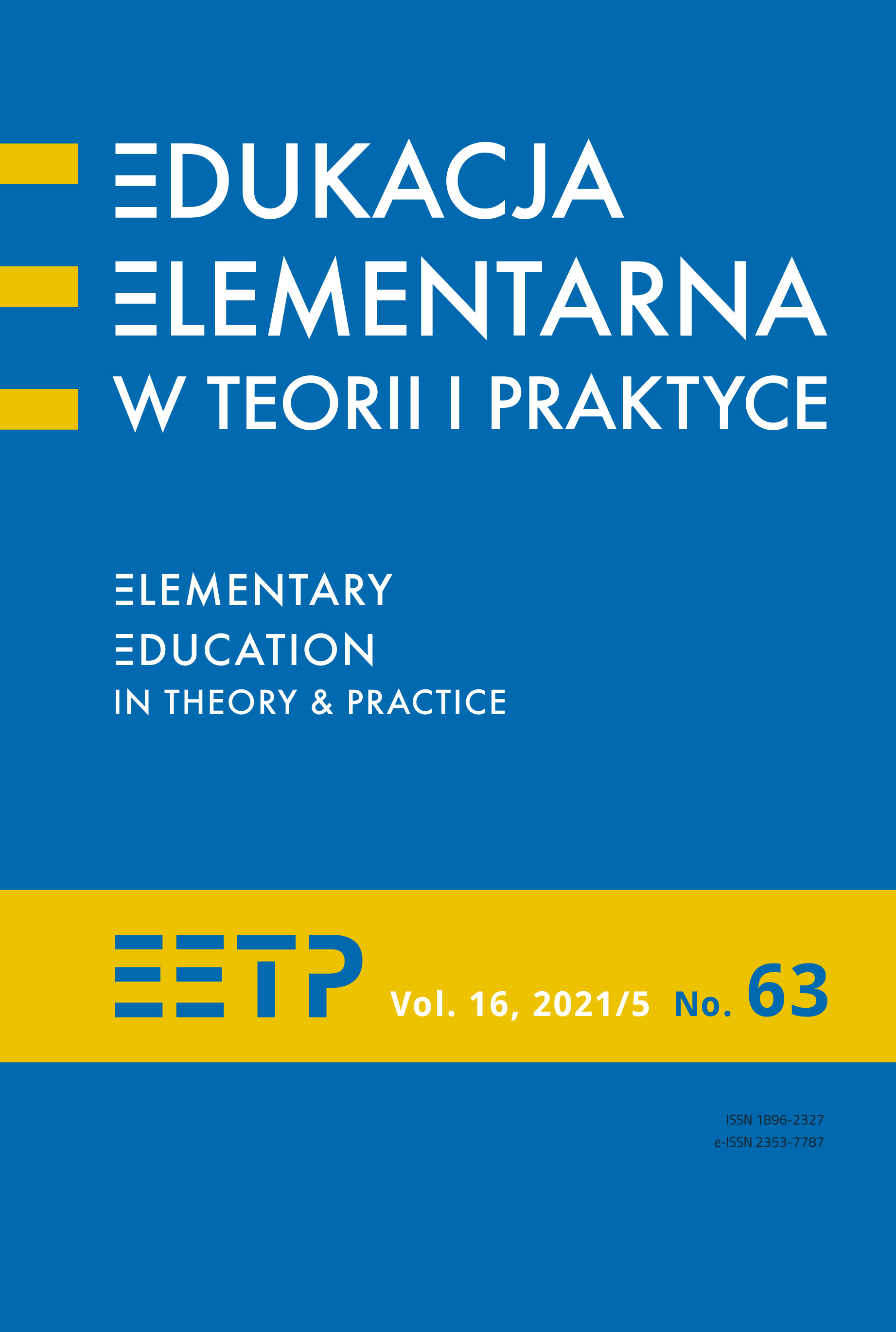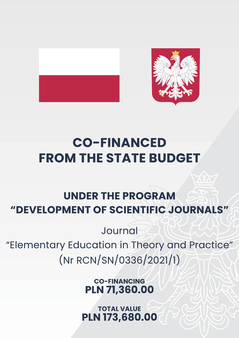Inquiry Based Science Education (IBSE) and STEAM in Kindergarten and Sustainable Development
Abstract
The objective of the article is to show the educational assumptions for sustainable development, as well as the ability to fulfil them in preschool. Such education encompasses aspects related to ecological, social and economic education, perceiving them as elements of a whole. Moreover, education for sustainable development is closely connected with actions promoting the sustainable quality of life. It helps us understand ourselves and the surrounding reality, and it enables us to build good relationships with people. Starting from the assumption that we have to depart from deductive methods in the process of education, the author of the article presents the assumptions of the methods based on inquiry, reasoning and STEAM. On the basis of the analysis and comparison of Polish curricula of preschool education for the years 1999, 2008 and 2017, their interpretation was prepared. The main assumption of this analysis is indicating the direction of changes and opportunities to introduce the methods that are to improve the quality of preschool children education. We live in the era of the society of knowledge which is changing and becoming more and more complex, which is why the situation requires new competences.
References
Borys T. (2010). Dekada edukacji dla zrównoważonego rozwoju – polskie wyzwania. „Problemy Ekorozwoju”. Vol. 5, nr 1, s. 59-70.
Catalonian Structure Decree 181/2010 2n Cycle EI https://dibaaps.diba.cat/scripts/ftpisa.aspx?fnew?cido&dogc/2008/09/20080916/08247053.pdf (dostęp: 15.11.2021).
Davies A., Fidler D., Gorbis M. (2011). Future Work Skills 2020. California: Institute for the Future for University of Phoenix Research Institute. http://hdl.voced.edu.au/10707/194830 (dostęp: 10.02.2020).
Delors J. (1998) Raport dla UNESCO Międzynarodowej Komisji do spraw Edukacji dla XXI wieku „Edukacja – jest w niej ukryty skarb”. https://www.unesco.pl/fileadmin/user_upload/pdf/4_Filary_Raport_Delorsa.pdf (dostęp: 15.11.2021).
Drucker P.F. (1994) The Age of Social Transformation, „The Atlantic Monthly”, No. 274, 53-80.
Dylak S. (2000). Konstruktywizm jako obiecująca perspektywa kształcenia nauczycieli, w: Współczesność a kształcenie nauczycieli, red. H. Kwiatkowska, S. Dylak, Wyższa Szkoła Pedagogiczna ZNP, Warszawa 2000,
Dylak S., Ubermanowicz S. (red.). (2014). Strategia nauczania-uczenia się infotechniki. Poznań: Fundacja Wolnego i Otwartego Oprogramowania.
Emer W., Lenzen K-D. (1997) Methoden des Projektunterrichts. [w:] Theorie des Projektunterrichts, (red.) J. Bastian, H. Gudjons, J. Schnack, M. Speth; (tłum. M. Krogulec-Sobowiec). Hamburg: Publikationsserver der Universität Potsdam, 213-230.
Gruszczyk-Kolczyńska E. (2009). Komentarz do podstawy programowej wychowania przedszkolnego. [w:] Podstawa programowa z komentarzami. Edukacja przedszkolna i wczesnoszkolna. Tom 1, Warszawa: MEN.
IBSE_Modello_5E.pdf. (2021), https://unikore.it/phocadownload/userupload/3fa0b64bac/IBSE_Modello_5E.pdf (dostęp: 15.11.2021).
Jarugowa A., Fijałkowska J. (2002). Rachunkowość i zarządzanie kapitałem intelektualnym, koncepcje i praktyka, Gdańsk: ODDK.
Jeruszka U. (2016). Kompetencje. Aspekty teoretyczne i praktyczne. Warszawa: Difin.
Kitchen Lab 4 Kids. http://kitchenlab4kids.eu/
Komisja Europejska (2007).Kompetencje kluczowe w uczeniu się przez całe życie – Europejskie ramy odniesienia. Belgia: Wspólnoty Europejskie. https://op.europa.eu/pl/publication-detail/-/publication/5719a044-b659-46de-b58b-606bc5b084c1 (dostęp: 7.08.2020).
Krogulec-Sobowiec M. (2008). Uczenie się uczniów poprzez metodę projektu. XIV Konferencja Diagnostyki Edukacyjnej. Uczenie się i egzamin w oczach nauczyciela. Opole: Grupa Tomami. http://www.ptde.org/file.php/1/Archiwum/XIV_KDE/krogulec.pdf (dostęp: 15.11.2021).
Kwaśnica R. (2007). Dwie racjonalności. Od filozofii sensu ku pedagogice ogólnej, Wrocław: Wyd. Nauk. DSWE TWP.
Makulska D. (2012). Kluczowe czynniki rozwoju w gospodarce opartej na wiedzy. „Prace i Materiały Instytutu Rozwoju Gospodarczego”. Nr 88. S 169-193.
Mempel-Śnieżyk A. (2008). Od gospodarki przemysłowej do gospodarki opartej na wiedzy. „Zeszyty Naukowe Uniwersytetu Szczecińskiego”. 501, nr 22, s. 285-292.
Radomska E. (2015). Innowacyjność jako wyzwanie rozwojowe – uwarunkowania działalności innowacyjnej przedsiębiorstw. „Kwartalnik Naukowy Uczelni Vistula”. 4(46), s. 63-85.
Report Final (2020). http://kitchenlab4kids.eu/wp-content/uploads/2020/03/Research-Report-Final-25.02.2020.pdf (dostęp: 30.09.2021).
Rozporządzenie Ministra Edukacji Narodowej z 23 grudnia 2008 r. w sprawie podstawy programowej wychowania przedszkolnego oraz kształcenia ogólnego w poszczególnych typach szkół (Dz.U. z 2009 r. nr 4, poz. 17)
Rozporządzenie Ministra Edukacji Narodowej z dnia 14 lutego 2017 r. w sprawie podstawy programowej wychowania przedszkolnego oraz podstawy programowej kształcenia ogólnego dla szkoły podstawowej, w tym dla uczniów z niepełnosprawnością intelektualną w stopniu umiarkowanym lub znacznym, kształcenia ogólnego dla branżowej szkoły I stopnia, kształcenia ogólnego dla szkoły specjalnej przysposabiającej do pracy oraz kształcenia ogólnego dla szkoły policealnej Dz.U. 2017 poz. 356
Rozporządzenie Ministra Edukacji Narodowej z dnia 15 lutego 1999 r. w sprawie podstawy programowej kształcenia ogólnego. Dz.U. 1999 nr 14 poz. 129 https://www.prawo.pl/akty/dz-u-1999-14-129,16833568.html (dostęp: 15.11.2021).
Surma B. (2017). Koncepcja wychowania religijnego dziecka w myśli pedagogicznej Sofii Cavalletti. Geneza, założenia teoretyczne i recepcja. Kraków: Akademia Ignatianum w Krakowie, Wydawnictwo WAM.
Szewczuk K. (2021). Zaangażowanie studentów kierunków nauczycielskich w edukację STE(A)M – przykłady dobrych praktyk, „Edukacja Elementarna w Teorii i Praktyce”, vol. 16, nr 5(63). DOI: 10.35765/eetp.2021.1663.03
Więckowski R. (1993). Pedagogika wczesnoszkolna. Warszawa: WSiP.
Zdybel, D., Pulak, I., Crotty, Y., Fuertes, M. T., & Cinque, M. (2020). Rozwijanie umiejętności STEM w przedszkolu. Możliwości i wyzwania z perspektywy przyszłych nauczycieli. „Edukacja Elementarna w Teorii i Praktyce”, 14(4(54), 71-94. https://doi.org/10.35765/eetp.2019.1454.06
Zemło M. (2008). Społeczeństwo wiedzy – kwestia bliskiej czy odległej przyszłości? „Przegląd Socjologiczny” vol. 57, nr 3, s. 59-77.

This work is licensed under a Creative Commons Attribution-NoDerivatives 4.0 International License.
- When submitting a text, the author declares that he/she is the Author of the article (hereinafter referred to as the “Work”) and:
- he/she owns the exclusive and unlimited copyright to the Work,
- is entitled to dispose of the copyright to the Work.
Declares that it does not infringe any third party copyrights or legal rights.
Declares that there is no conflict of interest.
2. At the same time, the Author grants the Ignatianum University in Cracowa royalty-free, non-exclusive and territorially unlimited licence to use the Work in the following fields of exploitation:
- recording the Work in a hard copy, as well as on a digital or magnetic medium;
- reproduction of the Work using any technique, without limitation of the number of editions or copies;
- distribution of the Work and its copies on any medium, including marketing, sale, lending, and rental;
- introduction of the Work into a computer memory;
- disseminating the Work in information networks, including in the Internet;
- public performance, exhibition, display, reproduction, broadcasting and re-broadcasting, as well as making the Work available to the public in such a way that everyone can have access to it at a time and place of their own choosing;
- within the scope of dependent rights to the Work, including in particular the right to make necessary changes to the Work resulting from editorial and methodical development, as well as to translate the Work into foreign languages;
The licence is granted from the moment of the transfer of the Work to the Ignatianum University in Cracow. The Ignatianum University in Cracow is entitled to grant further sub-licences to the Work within the scope of the right granted. The licence is time-limited and it is granted for a period of 15 years, starting from the date of its granting.
Authors are permitted and encouraged to publish their text online (e.g. in their institution’s repository or on the institution’s website) before or during the submission process as this may lead to beneficial exchanges, as well as earlier and greater citation of the published text (See The Effect of Open Access). We recommend using any of the following portals of research associations:
- ResearchGate
- SSRN
- Academia.edu
- Selected Works
- Academic Search





